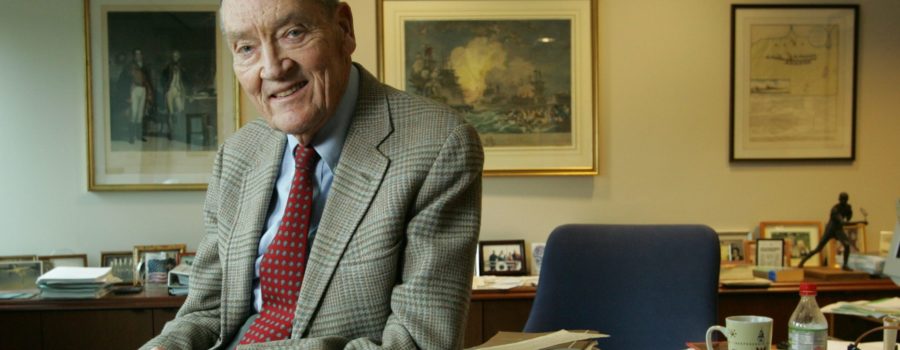The investment industry is remembering passive investing pioneer Jack Bogle following his death at the age of 89.
As founder of Vanguard, one of the largest investment providers in the world, and creator of the first retail index mutual fund, Bogle has a profound impact on all investors.
He started his investing career back in 1951, after his thesis on the economic role of the investment company came to the attention of Walter L. Morgan, founder of the Wellington Fund.
At the age of 35, in 1965, Bogle became executive vice president of Wellington Management Company. He went on to merge the business with Thorndike, Doran, Paine & Lewis, a fund management firm based in Boston.
In short order, Bogle became the CEO of Wellington.
It was the bear market of 1973-74, and a period of poor investment performance for Wellington’s funds, that resulted in a management dispute and Bogle being fired.
This departure from Wellington was his spark to start a new mutual fund company, providing administrative services to the funds on an at-cost basis.
The new organisation was The Vanguard Group, opening its doors for business on 1st May 1975 with responsibility for $1.8 billion in assets under management.
As part of what was known as “The Vanguard Experiment”, mutual funds were run at cost and independently. Each had their own directors, officers and staff.
This approach to fund management was a radical departure from the status quo, as mutual funds at the time were run by external management companies for profit.
Bogle ran this experiment to prove that mutual funds could be run independently, in a way that would directly benefit their shareholders.
It was in 1976 that Jack Bogle introduced index investing to retail investors, with the launch of the First Index Investment Trust.
The index fund launch was widely panned at the time, called “un-American” and “a sure path to mediocrity”. It only raised $11 million during its initial underwriting; a fairly paltry sum, even in the mid-1970s.
This fund however went on to become the Vanguard 500 Index Fund, one of the largest in the global investment industry, with around $5 trillion in assets under management.
Bogle pioneered a further investment innovation in 1977, moving from a broker-dealer distribution model to a no-load system. He said at the time that “a no-load distribution network was a logical choice for a firm with our simple investment principles and rock-bottom costs.”
Throughout his career, Bogle was a huge supporter of the mutual fund (better known here in the UK as a collective investment fund) but a harsh critic of high costs, deceptive advertising and product proliferation.
As well as launching low-cost index funds for retail investors, Jack Bogle was a prolific writer, as author of 12 books. His best-seller was Bogle on Mutual Funds, published in 1994 and praised by Warren Buffett at the time as “the definitive book on mutual funds”.
Within this book, in a foreword by Nobel Prize-winning economist Paul A. Samuelson, it was observed: “John Bogle has changed a basic industry in the optimal direction. Of very few can this be said.”
One of the proudest moments of my own career was, last year, having my writing appear in a book along with a chapter from Jack. We both contributed chapters to Harriman’s New Book of Investing Rules: The Do’s and Don’ts of the World’s Best Investors.
On the news of his death, Vanguard CEO Tim Buckley said:
As you may already know, this is a sad day for Vanguard.
We lost a good friend. And mutual fund investors everywhere have lost one of their most passionate advocates.
Jack Bogle was the founder of our company, and its leader for more than two decades.
By creating a client-owned company—or as he himself liked to say, “the only mutual mutual fund company,” Jack Bogle put billions of dollars back into the pockets of investors.
And he influenced the entire mutual fund industry in a positive manner. Without Vanguard, I’m certain that costs would be higher for investors across the mutual fund industry.
Jack Bogle’s life and career had a profound and lasting impact on investors everywhere, probably saving countless amounts in fees that would have otherwise been paid to higher cost mutual funds.
John Clifton Bogle, known as “Jack”, died on 16th January 2019 at his home in Bryn Mawr, Pennsylvania. He is is survived by his wife Eve, their children and grandchildren.

